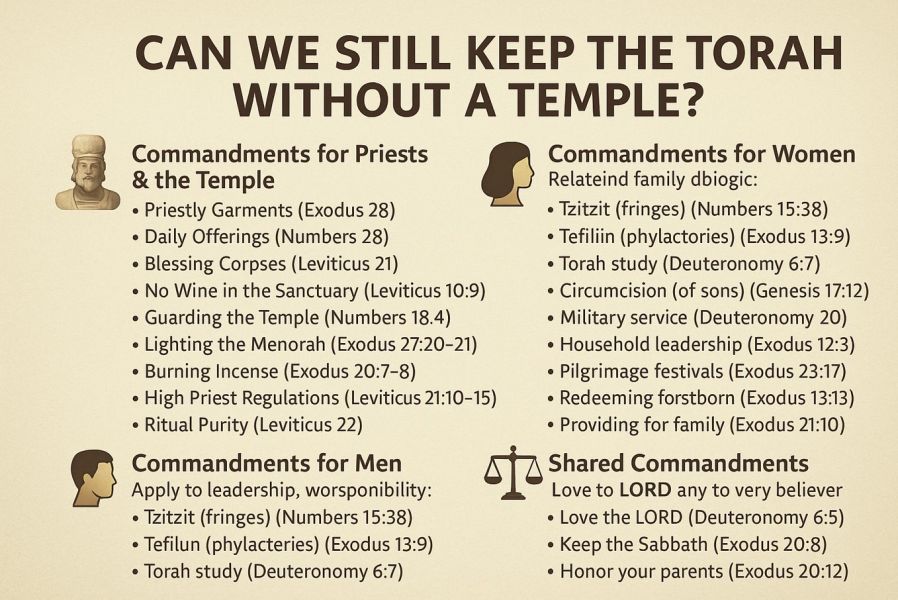📜 Can We Still Keep the Torah Without a Temple?
Many people today argue, “We can’t follow the Torah because there’s no Temple or priests.” But is that really true?
While some commandments do indeed apply specifically to the #Temple and priesthood, the majority of God’s laws were given for daily living, family structure, and moral conduct — and are still just as relevant today.
Let’s break it down by category:
🛕 Commandments for Priests & the Temple
These mitzvot were specific to the kohanim (priests), the Levites, and the service of the Tabernacle/Temple.
-
Priestly Garments — Exodus 28
-
Daily Offerings — Numbers 28
-
Blessing the People — Numbers 6:23–27
-
Avoiding Corpses — Leviticus 21
-
No Wine in the Sanctuary — Leviticus 10:9
-
Guarding the Temple — Numbers 18:4
-
Lighting the Menorah — Exodus 27:20–21
-
Burning Incense — Exodus 30:7–8
-
High Priest Regulations — Leviticus 21:10–15
-
Ritual Purity — Leviticus 22
-
Receiving Tithes — Numbers 18
-
Blowing Silver Trumpets — Numbers 10
These are not currently active due to the lack of a functioning Temple — but this only represents a fraction of #Torah commandments.
👩 Commandments for Women
Some laws relate to women based on family and biological roles:
-
Niddah (menstrual purity) — Leviticus 15:19–24
-
Childbirth purification — Leviticus 12
-
Head covering (traditionally) — Numbers 5:18
-
Modesty in dress — Deuteronomy 22:5
-
Marriage vows — Numbers 30:3–16
-
Bearing children (blessing/mitzvah) — Genesis 1:28
-
Challah separation — Numbers 15:20
While not all women are the same, many of these are household-based and still practicable today.
👨 Commandments for Men
Torah places certain duties upon men, often related to leadership, worship, and responsibility:
-
Tzitzit (fringes) — Numbers 15:38
-
Tefillin (phylacteries){see below, not literal} — Exodus 13:9
-
Torah study — Deuteronomy 6:7
-
Circumcision (of sons no longer required) — Genesis 17:12
-
Military service — Deuteronomy 20
-
Household leadership — Exodus 12:3
-
Pilgrimage festivals — Exodus 23:17
-
Redeeming firstborn — Exodus 13:13
-
Providing for family — Exodus 21:10
These commands are personal, not dependent on a Temple.
⚖️ Commandments Shared by All
These apply to every believer, man or woman, priest or layperson:
-
Love the LORD — Deuteronomy 6:5
-
Keep the Sabbath — Exodus 20:8
-
Honor your parents — Exodus 20:12
-
Do not lie — Exodus 20:16
-
Celebrate God’s Feasts — Leviticus 23
These are timeless instructions meant for all generations. There are many more commands like do not make idols, men should have beards, post Commands on door posts, and so on but this is a sample of the commands from God. For a complete list that you can print out and start implementing download our starter guide for the Commands of God, password is "i will obey" all lowercase, be sure to include the spaces between the words.
✅ Conclusion:
Only a small portion of the Torah depends on the Temple. Most of God’s commandments are still alive — and still within reach.
“For this commandment which I command thee this day, it is not hidden from thee, neither is it far off.” — Deuteronomy 30:11
Let’s stop making excuses and start walking in obedience — wherever we are, and whatever the times.
When Did Phylacteries (Tefillin) Start?
Phylacteries, or tefillin in Hebrew, are small leather boxes containing Torah verses, worn during weekday prayers — traditionally on the arm and forehead — as a literal fulfillment of verses like:
-
Exodus 13:9 – “It shall be a sign unto thee upon thine hand, and for a memorial between thine eyes…”
-
Deuteronomy 6:8 – “And thou shalt bind them for a sign upon thine hand, and they shall be as frontlets between thine eyes.”
🔹 Historical Origin:
-
These commands were given during the time of Moses (~15th century BCE), but evidence of literal boxes (tefillin) doesn't appear archaeologically until much later:
-
Dead Sea Scrolls (Qumran) — 1st century BCE, actual tefillin discovered
-
Pharisaic tradition (2nd Temple period) took these verses literally
-
Karaite Jews (who reject Rabbinic tradition) interpret these verses metaphorically
-
So, while the command was given in the Torah, the practice of physical tefillin as worn today developed and became standardized later, particularly among Pharisees (the forerunners of Rabbinic Judaism).
🔍 Meaning of Ezekiel 13:9
“And mine hand shall be upon the prophets that see vanity, and that divine lies: they shall not be in the assembly of my people, neither shall they be written in the writing of the house of Israel...” — Ezekiel 13:9
This verse is not about tefillin but about false prophets. The “writing of the house of Israel” refers to God's divine registry of His true people — not literal phylacteries.
🔹 Context:
-
Ezekiel is condemning false prophets in Israel
-
God's "hand" will be against them
-
They will be excluded from:
-
The counsel (assembly) of God’s people
-
The record (scroll/writing) of His chosen
-
The land (inheritance) of Israel
-
✨ Summary
-
Tefillin (phylacteries) come from #Torah commands but became physically practiced later in Jewish tradition.
-
Ezekiel 13:9 refers to divine exclusion of false prophets — not to #tefillin.
-
The “writing” in Ezekiel is likely symbolic of God’s book of life or covenantal record, not an object worn on the body.
